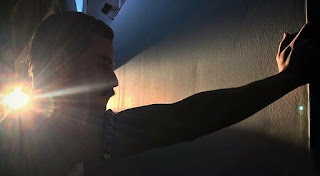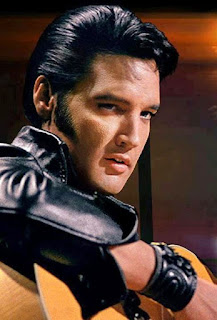Elvis seemed to be the epitome of the American dream. But as Elvis’s career went upward, his control over his success sloped inversely downward. He took career advice from a manager who was taking 50% of his earnings (the going rate was 10%) and who pushed him constantly. By 1970, Elvis’s talent had become a commodity over which he had little control. Rather than enabling him to achieve the American dream, his ability was destroying him. His grueling schedule had him increasingly dependent on prescription drugs.
What Elvis wrote to Nixon was that he craved solid middle-class respectability. “I admire you and have great respect for your office,” he wrote. Countercultural figures might call the president and his advisors “the establishment,” but “I call it American and I love it. I will be of any service that I can to help the country out.” Elvis and President Nixon had something in common, and the singer made sure to point it out: “I believe that you, Sir, were one of the Top Ten Outstanding Men of America also.” He gave President Nixon some Presley family photos and a commemorative WWII Colt 45, and warned him that the Beatles had been fomenting anti-Americanism. As the White House notes from the meeting relate: “Presley indicated to the President in a very emotional manner that he was ‘on your side.’ At the conclusion of the meeting, Presley again told the President how much he supported him, and then, in a surprising, spontaneous gesture, put his left arm around the President and hugged him.” The gist of this meeting was that, more than anything, he wanted legitimacy. Elvis wanted to achieve the American Dream—not to be rich and famous (although he certainly was), but to be respectable. Source: historicalsociety.blogspot.com
Elvis Presley’s former Bel Air mansion is on the market, and it's no jailhouse! The six bedroom, seven bathroom Regency-style home sits on over an acre of gated and private land with beautiful views of the city and ocean below. When you walk inside, you’ll feel the glitz and glamour of Old Hollywood with a grand round foyer glistening with light from the sparkly chandelier and candelabra wall sconces. The chef’s kitchen features gray cabinets and industrial-style counters and backsplashes. We wonder how many peanut butter and banana sandwiches were made in here. In the spacious master suite, there’s a marble fireplace to keep you warm on cool nights. The master bathroom is huge, with lots of vanity space, a Jacuzzi tub and its own chandelier. Owning this piece of Hollywood history is going to cost you—$23.45 million to be exact. Source: www.today.com
The mood in America is arguably as dark as it has ever been in the modern era. The birthrate is at a record low, and the suicide rate is at a 30-year high; mass shootings and opioid overdoses are ubiquitous. In the aftermath of 9/11, the initial shock and horror soon gave way to a semblance of national unity in support of a president whose electoral legitimacy had been contested. Today’s America is instead marked by fear and despair more akin to what followed the crash of 1929, when millions of Americans lost their jobs and homes after the implosion of businesses ranging in scale from big banks to family farms. It’s not hard to pinpoint the dawn of this deep gloom: It arrived in September 2008, when the collapse of Lehman Brothers kicked off the Great Recession that proved to be a more lasting existential threat to America than the terrorist attacks. The shadow it would cast is so dark that a decade later, even our current run of ostensible prosperity does not mitigate the one conviction that still unites all Americans: Everything in the country is broken. That loose civic concept known as the American Dream — initially popularized during the Great Depression by the historian James Truslow Adams in his Epic of America — has been shattered. Unlike 9/11 nvestigations, the Great Recession never yielded a reckoning that might have helped restore that faith. Millennials, crippled by debt, mock the traditional American tenet that each generation will be better off than the one before.
In the Digital Century, unlike the preceding American Century, the largest corporations are not admired as tangible goods that might enrich and empower all. They’re seen instead as impenetrable black boxes where our most intimate personal secrets are bought and sold to a shadowy Über-class of obscene wealth and privilege. As the historian Elaine Tyler May, a scholar of postwar America, has written, the Cold War boom projected to the world a “vision of middle-class affluence” that testified to “the benefits of the American capitalist system” over the Soviet alternative. Central to that vision was “the belief that free-market capitalism would benefit everyone” and that its fruits would be distributed equitably, “providing the good life to an ever-expanding middle class.” This bedrock belief in economic fairness “motivated white working-class and middle-class Americans to play by the rules.” The assumption was that the ownership class would play by them too. A 1908 editorial in the Kansas Times, invoking “American dreams,” championed “the equitable distribution of wealth” while making note of the vast discrepancy between the pay of an insurance-company executive and a headmaster: “Why do we accord highest place to money mongers and lowest place to teachers of ideals?”
While the Gilded Age tycoon J. P. Morgan posited that the ratio between a boss’s income and that of workers should be 20-1, today that ratio often exceeds 150-1. As Tyler May points out, it took the Great Recession’s destruction “of what had been the markers of citizenship for more than half a century” — a secure job and home ownership — to make unmistakable to all “the end of the era of widespread prosperity that had characterized the United States in the early years of the Cold War.” It was during the Great Recession that it also became clear how oblivious — or complicit — both major parties’ Establishments were. Perhaps the sole upside to the 2008 crash was that it discredited the Establishment of both parties by exposing its decades-long collusion with a kleptocratic economic order. The moral abdication of would-be liberal reformers only added to the national disgust with elites. As Sarah Churchwell tracks in Behold, America, the original America First movement of the 1920s and ’30s grew in tandem with the widening economic discrepancies of the time.
She reminds us that the plutocratic villain of The Great Gatsby, Tom Buchanan, is a white supremacist. Up against such powerful villian, the vision of limitless human potential implicit in Jay Gatsby’s innocent American Dream didn’t stand a chance. The Great Gatsby, which was published to disappointing sales and reviews in 1925. It is almost too exquisite an irony that in 1927, the budding real-estate developer Fred Trump would be arrested at a Ku Klux Klan riot in Queens, not far from Tom Buchanan’s home in Fitzgerald’s fictional Long Island enclave of East Egg. The rest is history inexorably leading America to this dark place where, nearly a century later, the green light at the end of Daisy’s dock is more and more distant. Source: nymag.com
The mood in America is arguably as dark as it has ever been in the modern era. The birthrate is at a record low, and the suicide rate is at a 30-year high; mass shootings and opioid overdoses are ubiquitous. In the aftermath of 9/11, the initial shock and horror soon gave way to a semblance of national unity in support of a president whose electoral legitimacy had been contested. Today’s America is instead marked by fear and despair more akin to what followed the crash of 1929, when millions of Americans lost their jobs and homes after the implosion of businesses ranging in scale from big banks to family farms. It’s not hard to pinpoint the dawn of this deep gloom: It arrived in September 2008, when the collapse of Lehman Brothers kicked off the Great Recession that proved to be a more lasting existential threat to America than the terrorist attacks. The shadow it would cast is so dark that a decade later, even our current run of ostensible prosperity does not mitigate the one conviction that still unites all Americans: Everything in the country is broken. That loose civic concept known as the American Dream — initially popularized during the Great Depression by the historian James Truslow Adams in his Epic of America — has been shattered. Unlike 9/11 nvestigations, the Great Recession never yielded a reckoning that might have helped restore that faith. Millennials, crippled by debt, mock the traditional American tenet that each generation will be better off than the one before.
In the Digital Century, unlike the preceding American Century, the largest corporations are not admired as tangible goods that might enrich and empower all. They’re seen instead as impenetrable black boxes where our most intimate personal secrets are bought and sold to a shadowy Über-class of obscene wealth and privilege. As the historian Elaine Tyler May, a scholar of postwar America, has written, the Cold War boom projected to the world a “vision of middle-class affluence” that testified to “the benefits of the American capitalist system” over the Soviet alternative. Central to that vision was “the belief that free-market capitalism would benefit everyone” and that its fruits would be distributed equitably, “providing the good life to an ever-expanding middle class.” This bedrock belief in economic fairness “motivated white working-class and middle-class Americans to play by the rules.” The assumption was that the ownership class would play by them too. A 1908 editorial in the Kansas Times, invoking “American dreams,” championed “the equitable distribution of wealth” while making note of the vast discrepancy between the pay of an insurance-company executive and a headmaster: “Why do we accord highest place to money mongers and lowest place to teachers of ideals?”
While the Gilded Age tycoon J. P. Morgan posited that the ratio between a boss’s income and that of workers should be 20-1, today that ratio often exceeds 150-1. As Tyler May points out, it took the Great Recession’s destruction “of what had been the markers of citizenship for more than half a century” — a secure job and home ownership — to make unmistakable to all “the end of the era of widespread prosperity that had characterized the United States in the early years of the Cold War.” It was during the Great Recession that it also became clear how oblivious — or complicit — both major parties’ Establishments were. Perhaps the sole upside to the 2008 crash was that it discredited the Establishment of both parties by exposing its decades-long collusion with a kleptocratic economic order. The moral abdication of would-be liberal reformers only added to the national disgust with elites. As Sarah Churchwell tracks in Behold, America, the original America First movement of the 1920s and ’30s grew in tandem with the widening economic discrepancies of the time.
She reminds us that the plutocratic villain of The Great Gatsby, Tom Buchanan, is a white supremacist. Up against such powerful villian, the vision of limitless human potential implicit in Jay Gatsby’s innocent American Dream didn’t stand a chance. The Great Gatsby, which was published to disappointing sales and reviews in 1925. It is almost too exquisite an irony that in 1927, the budding real-estate developer Fred Trump would be arrested at a Ku Klux Klan riot in Queens, not far from Tom Buchanan’s home in Fitzgerald’s fictional Long Island enclave of East Egg. The rest is history inexorably leading America to this dark place where, nearly a century later, the green light at the end of Daisy’s dock is more and more distant. Source: nymag.com






























































